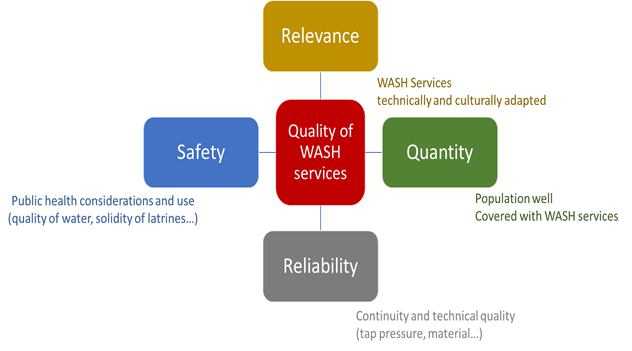...
The quality of WASH services that are provided to the affected population must meet minimum standards agreed among partners. Partners can either refer to national standards or to the Sphere standards, depending on the context. The quality of the WASH services embraces four main areas: relevance, quantity, reliability and safety (see figure hereunder);
WASH Coordination platform and partners must also agree on how and by who quality will be monitored:
- Most quality aspects should be monitored by partners, using their own internal quality monitoring mechanism (field visits, internal M&E system, feedback and complaints mechanism etc.)
- WASH coordination platform must strengthen and harmonize partner's quality monitoring system.
- Partners must report to the coordination platform on quality issues. Using this information, coordination platform can consolidate various reports from partners, report on the overall quality of the response and plan adequate support. Confidentiality of partners reports should be respected when required.
- The coordination platform team can also be directly involved in quality monitoring:
- Analyze and react on partner’s quality reports
- Implement ad-hoc or planned field visits of partners activities. This should be agreed with partners from the initial phase, so tension do not arise.
- Discuss quality issues with relevant actors who can influence them (local government, OCHA, donors etc.).
- Monitor some aspects of WASH services quality through the 5W: by adding relevant columns and formulas to a W matrix, it is possible to estimate if standards have been respected, such as quantity of water trucked per person and per day, number of users per latrines etc. This need information needs to be triangulated with field visits and partner’s quality monitoring reports.
